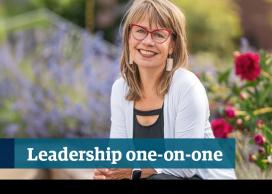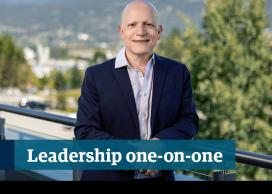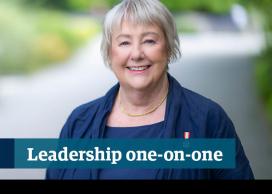Ian Cull is the Associate Vice-President, Students, at UBC’s Okanagan campus. As a leader of student life and experience at UBCO, student engagement is a top priority. With a Master of Arts in clinical psychology, an Honours degree in Anthropology, and a history of post-secondary career progression, Ian understands — first-hand — the importance of enhancing services, experiences, and learning opportunities for students.
Q1. What quality do you most admire in a leader?
IC: I think leaders need to be authentic and they need to have the best interests of the team as foremost in their minds. Leadership is about working together with colleagues and peers in order to tackle a common enterprise.
Q2. What makes you laugh?
IC: I like physical comedy and comedians who can be really versatile. I also really like Steve Martin, George Carlin, Lily Tomlin and Goldie Hawn.
Q3. Who inspires you, and why?
IC: My mother is an exceptional human being. I always appreciated the fact that she never gave me unsolicited advice. I was allowed to ask her questions, but she let me work things out on my own. Because of this, I grew up with a real sense of independence and empowerment. I was responsible for my actions and had to take responsibility, but regardless of the mistakes I made along the way, I always knew that I was welcomed home. It’s something I’ve carried with me and it’s how I treat the people I work with.
Q4. What’s your biggest accomplishment (so far) at UBC?
IC: The expansion of UBC Okanagan — I take a lot of pride knowing that I’ve contributed to the growth of this campus. For the past 13 years, we have grown enrolments, created a vibrant student life, and created an athletics program, among other things. For several years, we all had to be generalists to get UBC Okanagan to the level it needed to be.
Q5. What is the most important lesson you’ve learned in your career to date?
IC: I have discovered that I can get almost anything done, if I don’t care who gets credit for it. There are a lot of things that I know would improve student life at UBC Okanagan, but often, those things are outside of my purview. If I’m peripheral to it, I need to find someone who can champion a project, and as long as it happens and it’s executed well, that’s all that matters.
Q6. How do you like to recharge?
IC: I like playing sports and being out in nature. I grew up in very rural settings in Northern Ontario, so a big part of my life was learning to live in the outdoors and doing extreme wilderness hikes. Right now, I enjoy playing tennis, skiing, golfing, paddle-boarding and hiking, of course. Being in nature still gives me a lot of peace and comfort.
Q7. What is the best advice you were ever given?
IC: There are two kinds of listening: listening to understand and listening to form a reply. You need to learn to be patient and to listen to understand.
Q8. What would you like to be remembered for?
IC: I would like people to say that they enjoyed their time with me and that they feel proud of what we’ve accomplished together. I want people to remember our collective achievements.
Q9. If you could have a super power, what would it be?
IC: It’s not really a superpower, but I would like to be able to play a musical instrument proficiently. Music was a big part of my family, but the musical gene seemed to have skipped me! I’d like to play the piano or maybe the guitar.
Q10. Looking back, how did your time as a post-secondary student impact your approach to leadership and student engagement today?
IC: I played volleyball in university and my involvement in sports really contributed to my approach to leadership. To be a successful teammate means that the needs and priorities of the team come first. You need to be able to navigate conflict and egos, and understand the different roles that contribute to team success. But you also need to commit to your team, while balancing everything else in life.
Q11. In your view, why does student engagement matter?
IC: We want students to feel an affinity for UBC Okanagan. The fact that a student chooses us, is important, so we need to give them the adventure of being here. We also need to keep them academically successful, teach them to become more resilient, and help them fall in love with their program.
Q12. For you, what makes UBCO different?
IC: UBC Okanagan is the frontier. It’s a start-up. It’s entrepreneurial and intimate. It has come a long way in 13 years.
There is something about being in a smaller community that impacts interactions between people. Our students want to feel like they’re part of a community where they know everyone. Cafeteria staff know students by name, librarians know students by name, and students know staff by name. It makes a difference and I never want to lose that.
Published: November 1, 2018
Interviewed by: Rivka Parris, UBC Internal Communications



